Challenges in Delivering Evidence-Based PI by Mental Health Nurses
VerifiedAdded on 2020/03/15
|7
|1586
|69
Report
AI Summary
This report investigates the challenges mental health nurses face when attempting to comply with evidence-based psychological interventions (PI) in acute mental health settings. The author's background is rooted in clinical placement experiences, aiming to identify the obstacles nurses encounter while utilizing therapeutic strategies and evidence-based interventions to provide person-centered care. The rationale behind the study highlights the existing tensions in delivering evidence-based PI to patients, aiming to address these challenges before providing monotonous acute mental health care and to establish psychological and behavioral interventions to support patients. The report includes a critical evaluation of relevant literature, including articles by Chew-Graham et al. (2011), Peters et al. (2011), and Yılmaz (2017), to identify factors influencing patient engagement, challenges in PI delivery, and the role of resilience in nurses' ability to cope with stressors. The author's observations during acute mental health placements revealed stressors such as lack of engagement, work overload, and communication breakdowns, emphasizing the need for support and a conducive environment for nurses to deliver effective interventions. The conclusion underscores the importance of addressing these challenges to enhance nurses' competency and expedite the recovery process of acute mental health patients.
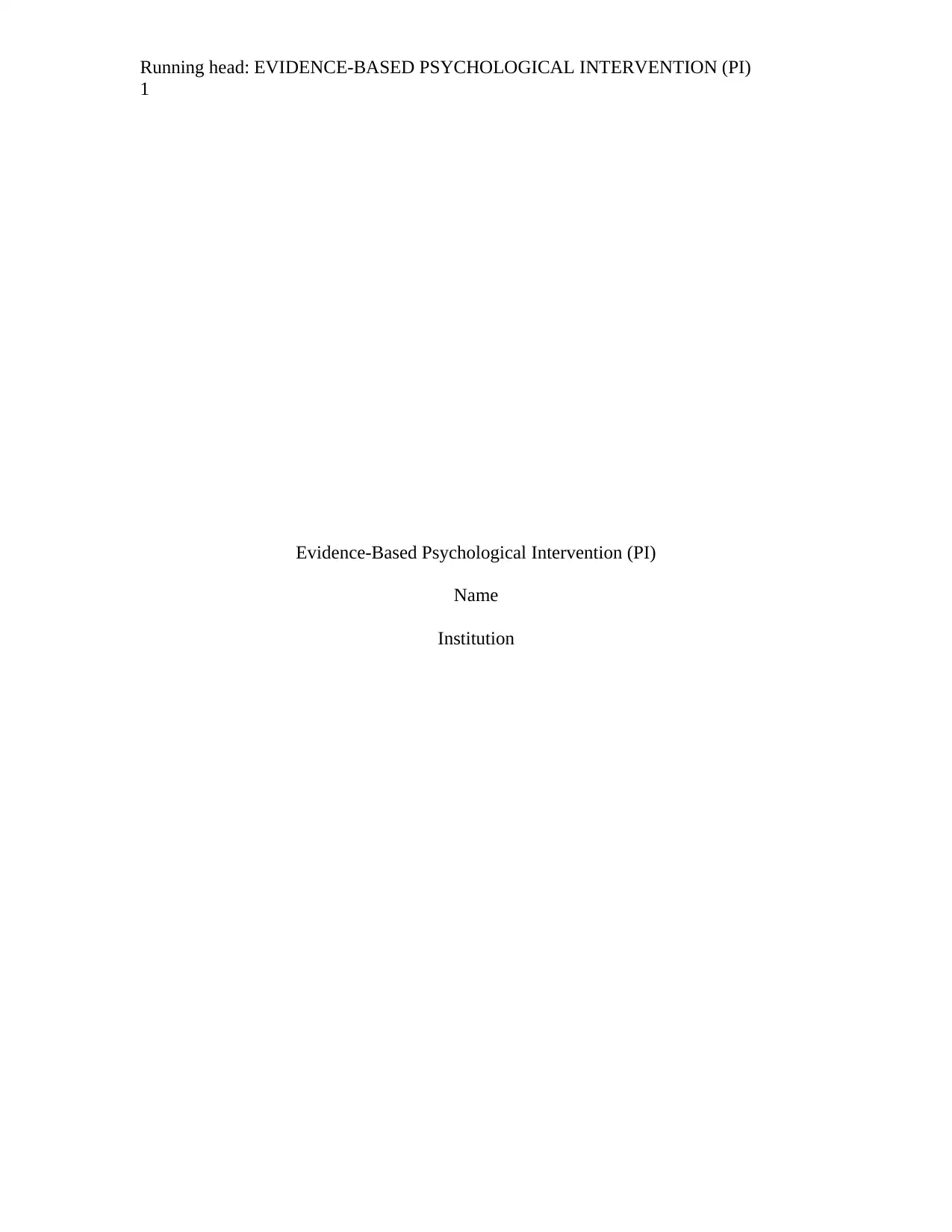
Running head: EVIDENCE-BASED PSYCHOLOGICAL INTERVENTION (PI)
1
Evidence-Based Psychological Intervention (PI)
Name
Institution
1
Evidence-Based Psychological Intervention (PI)
Name
Institution
Paraphrase This Document
Need a fresh take? Get an instant paraphrase of this document with our AI Paraphraser
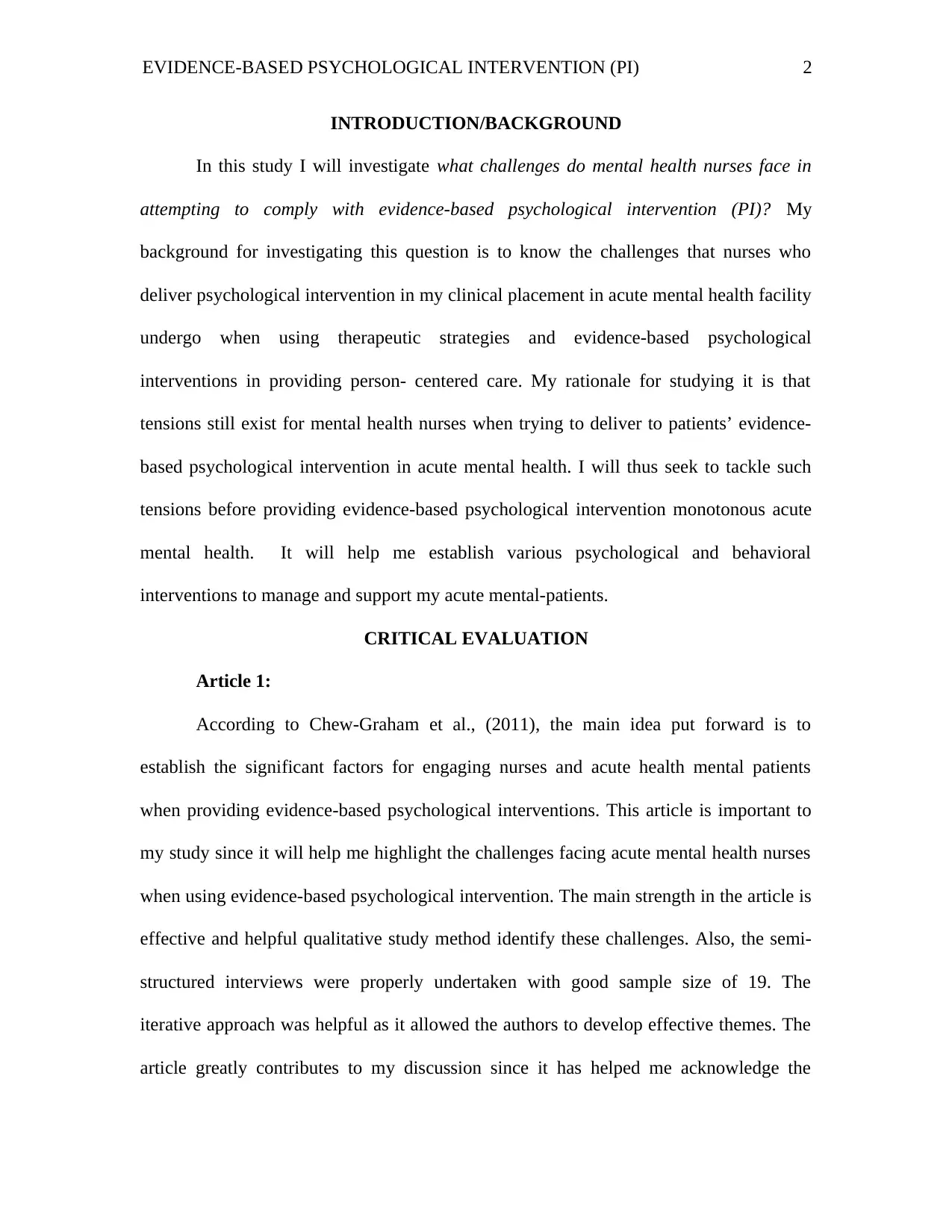
EVIDENCE-BASED PSYCHOLOGICAL INTERVENTION (PI) 2
INTRODUCTION/BACKGROUND
In this study I will investigate what challenges do mental health nurses face in
attempting to comply with evidence-based psychological intervention (PI)? My
background for investigating this question is to know the challenges that nurses who
deliver psychological intervention in my clinical placement in acute mental health facility
undergo when using therapeutic strategies and evidence-based psychological
interventions in providing person- centered care. My rationale for studying it is that
tensions still exist for mental health nurses when trying to deliver to patients’ evidence-
based psychological intervention in acute mental health. I will thus seek to tackle such
tensions before providing evidence-based psychological intervention monotonous acute
mental health. It will help me establish various psychological and behavioral
interventions to manage and support my acute mental-patients.
CRITICAL EVALUATION
Article 1:
According to Chew-Graham et al., (2011), the main idea put forward is to
establish the significant factors for engaging nurses and acute health mental patients
when providing evidence-based psychological interventions. This article is important to
my study since it will help me highlight the challenges facing acute mental health nurses
when using evidence-based psychological intervention. The main strength in the article is
effective and helpful qualitative study method identify these challenges. Also, the semi-
structured interviews were properly undertaken with good sample size of 19. The
iterative approach was helpful as it allowed the authors to develop effective themes. The
article greatly contributes to my discussion since it has helped me acknowledge the
INTRODUCTION/BACKGROUND
In this study I will investigate what challenges do mental health nurses face in
attempting to comply with evidence-based psychological intervention (PI)? My
background for investigating this question is to know the challenges that nurses who
deliver psychological intervention in my clinical placement in acute mental health facility
undergo when using therapeutic strategies and evidence-based psychological
interventions in providing person- centered care. My rationale for studying it is that
tensions still exist for mental health nurses when trying to deliver to patients’ evidence-
based psychological intervention in acute mental health. I will thus seek to tackle such
tensions before providing evidence-based psychological intervention monotonous acute
mental health. It will help me establish various psychological and behavioral
interventions to manage and support my acute mental-patients.
CRITICAL EVALUATION
Article 1:
According to Chew-Graham et al., (2011), the main idea put forward is to
establish the significant factors for engaging nurses and acute health mental patients
when providing evidence-based psychological interventions. This article is important to
my study since it will help me highlight the challenges facing acute mental health nurses
when using evidence-based psychological intervention. The main strength in the article is
effective and helpful qualitative study method identify these challenges. Also, the semi-
structured interviews were properly undertaken with good sample size of 19. The
iterative approach was helpful as it allowed the authors to develop effective themes. The
article greatly contributes to my discussion since it has helped me acknowledge the
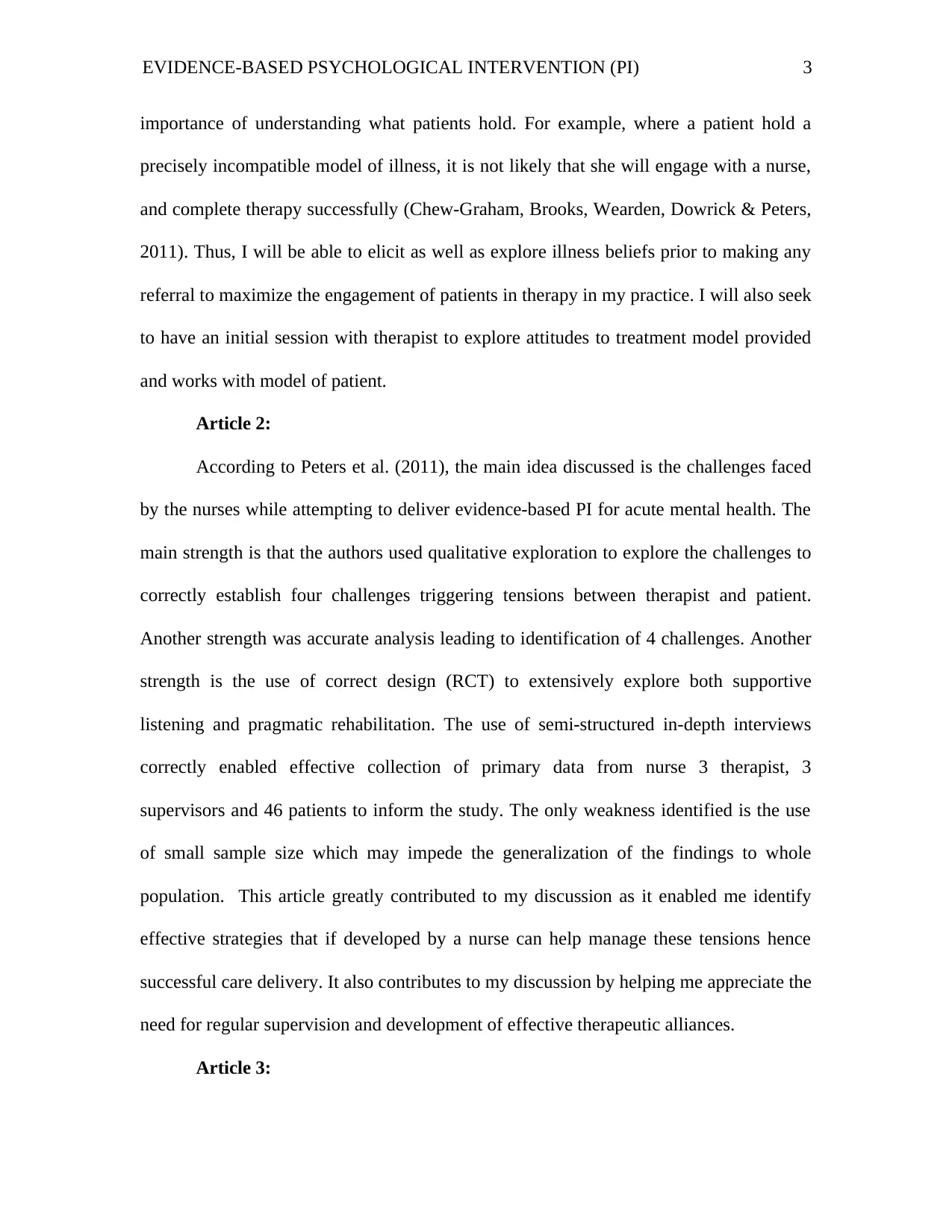
EVIDENCE-BASED PSYCHOLOGICAL INTERVENTION (PI) 3
importance of understanding what patients hold. For example, where a patient hold a
precisely incompatible model of illness, it is not likely that she will engage with a nurse,
and complete therapy successfully (Chew-Graham, Brooks, Wearden, Dowrick & Peters,
2011). Thus, I will be able to elicit as well as explore illness beliefs prior to making any
referral to maximize the engagement of patients in therapy in my practice. I will also seek
to have an initial session with therapist to explore attitudes to treatment model provided
and works with model of patient.
Article 2:
According to Peters et al. (2011), the main idea discussed is the challenges faced
by the nurses while attempting to deliver evidence-based PI for acute mental health. The
main strength is that the authors used qualitative exploration to explore the challenges to
correctly establish four challenges triggering tensions between therapist and patient.
Another strength was accurate analysis leading to identification of 4 challenges. Another
strength is the use of correct design (RCT) to extensively explore both supportive
listening and pragmatic rehabilitation. The use of semi-structured in-depth interviews
correctly enabled effective collection of primary data from nurse 3 therapist, 3
supervisors and 46 patients to inform the study. The only weakness identified is the use
of small sample size which may impede the generalization of the findings to whole
population. This article greatly contributed to my discussion as it enabled me identify
effective strategies that if developed by a nurse can help manage these tensions hence
successful care delivery. It also contributes to my discussion by helping me appreciate the
need for regular supervision and development of effective therapeutic alliances.
Article 3:
importance of understanding what patients hold. For example, where a patient hold a
precisely incompatible model of illness, it is not likely that she will engage with a nurse,
and complete therapy successfully (Chew-Graham, Brooks, Wearden, Dowrick & Peters,
2011). Thus, I will be able to elicit as well as explore illness beliefs prior to making any
referral to maximize the engagement of patients in therapy in my practice. I will also seek
to have an initial session with therapist to explore attitudes to treatment model provided
and works with model of patient.
Article 2:
According to Peters et al. (2011), the main idea discussed is the challenges faced
by the nurses while attempting to deliver evidence-based PI for acute mental health. The
main strength is that the authors used qualitative exploration to explore the challenges to
correctly establish four challenges triggering tensions between therapist and patient.
Another strength was accurate analysis leading to identification of 4 challenges. Another
strength is the use of correct design (RCT) to extensively explore both supportive
listening and pragmatic rehabilitation. The use of semi-structured in-depth interviews
correctly enabled effective collection of primary data from nurse 3 therapist, 3
supervisors and 46 patients to inform the study. The only weakness identified is the use
of small sample size which may impede the generalization of the findings to whole
population. This article greatly contributed to my discussion as it enabled me identify
effective strategies that if developed by a nurse can help manage these tensions hence
successful care delivery. It also contributes to my discussion by helping me appreciate the
need for regular supervision and development of effective therapeutic alliances.
Article 3:
⊘ This is a preview!⊘
Do you want full access?
Subscribe today to unlock all pages.

Trusted by 1+ million students worldwide
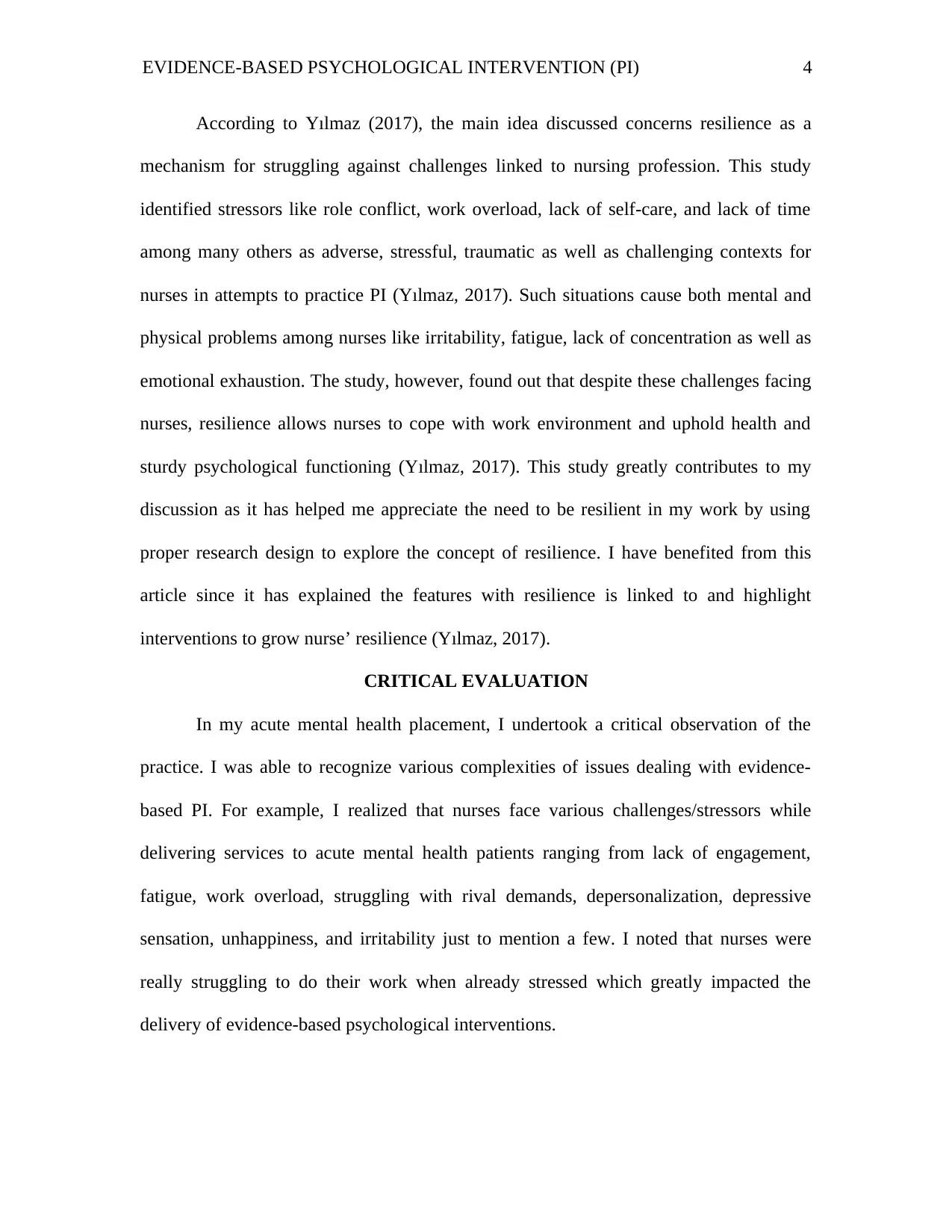
EVIDENCE-BASED PSYCHOLOGICAL INTERVENTION (PI) 4
According to Yılmaz (2017), the main idea discussed concerns resilience as a
mechanism for struggling against challenges linked to nursing profession. This study
identified stressors like role conflict, work overload, lack of self-care, and lack of time
among many others as adverse, stressful, traumatic as well as challenging contexts for
nurses in attempts to practice PI (Yılmaz, 2017). Such situations cause both mental and
physical problems among nurses like irritability, fatigue, lack of concentration as well as
emotional exhaustion. The study, however, found out that despite these challenges facing
nurses, resilience allows nurses to cope with work environment and uphold health and
sturdy psychological functioning (Yılmaz, 2017). This study greatly contributes to my
discussion as it has helped me appreciate the need to be resilient in my work by using
proper research design to explore the concept of resilience. I have benefited from this
article since it has explained the features with resilience is linked to and highlight
interventions to grow nurse’ resilience (Yılmaz, 2017).
CRITICAL EVALUATION
In my acute mental health placement, I undertook a critical observation of the
practice. I was able to recognize various complexities of issues dealing with evidence-
based PI. For example, I realized that nurses face various challenges/stressors while
delivering services to acute mental health patients ranging from lack of engagement,
fatigue, work overload, struggling with rival demands, depersonalization, depressive
sensation, unhappiness, and irritability just to mention a few. I noted that nurses were
really struggling to do their work when already stressed which greatly impacted the
delivery of evidence-based psychological interventions.
According to Yılmaz (2017), the main idea discussed concerns resilience as a
mechanism for struggling against challenges linked to nursing profession. This study
identified stressors like role conflict, work overload, lack of self-care, and lack of time
among many others as adverse, stressful, traumatic as well as challenging contexts for
nurses in attempts to practice PI (Yılmaz, 2017). Such situations cause both mental and
physical problems among nurses like irritability, fatigue, lack of concentration as well as
emotional exhaustion. The study, however, found out that despite these challenges facing
nurses, resilience allows nurses to cope with work environment and uphold health and
sturdy psychological functioning (Yılmaz, 2017). This study greatly contributes to my
discussion as it has helped me appreciate the need to be resilient in my work by using
proper research design to explore the concept of resilience. I have benefited from this
article since it has explained the features with resilience is linked to and highlight
interventions to grow nurse’ resilience (Yılmaz, 2017).
CRITICAL EVALUATION
In my acute mental health placement, I undertook a critical observation of the
practice. I was able to recognize various complexities of issues dealing with evidence-
based PI. For example, I realized that nurses face various challenges/stressors while
delivering services to acute mental health patients ranging from lack of engagement,
fatigue, work overload, struggling with rival demands, depersonalization, depressive
sensation, unhappiness, and irritability just to mention a few. I noted that nurses were
really struggling to do their work when already stressed which greatly impacted the
delivery of evidence-based psychological interventions.
Paraphrase This Document
Need a fresh take? Get an instant paraphrase of this document with our AI Paraphraser
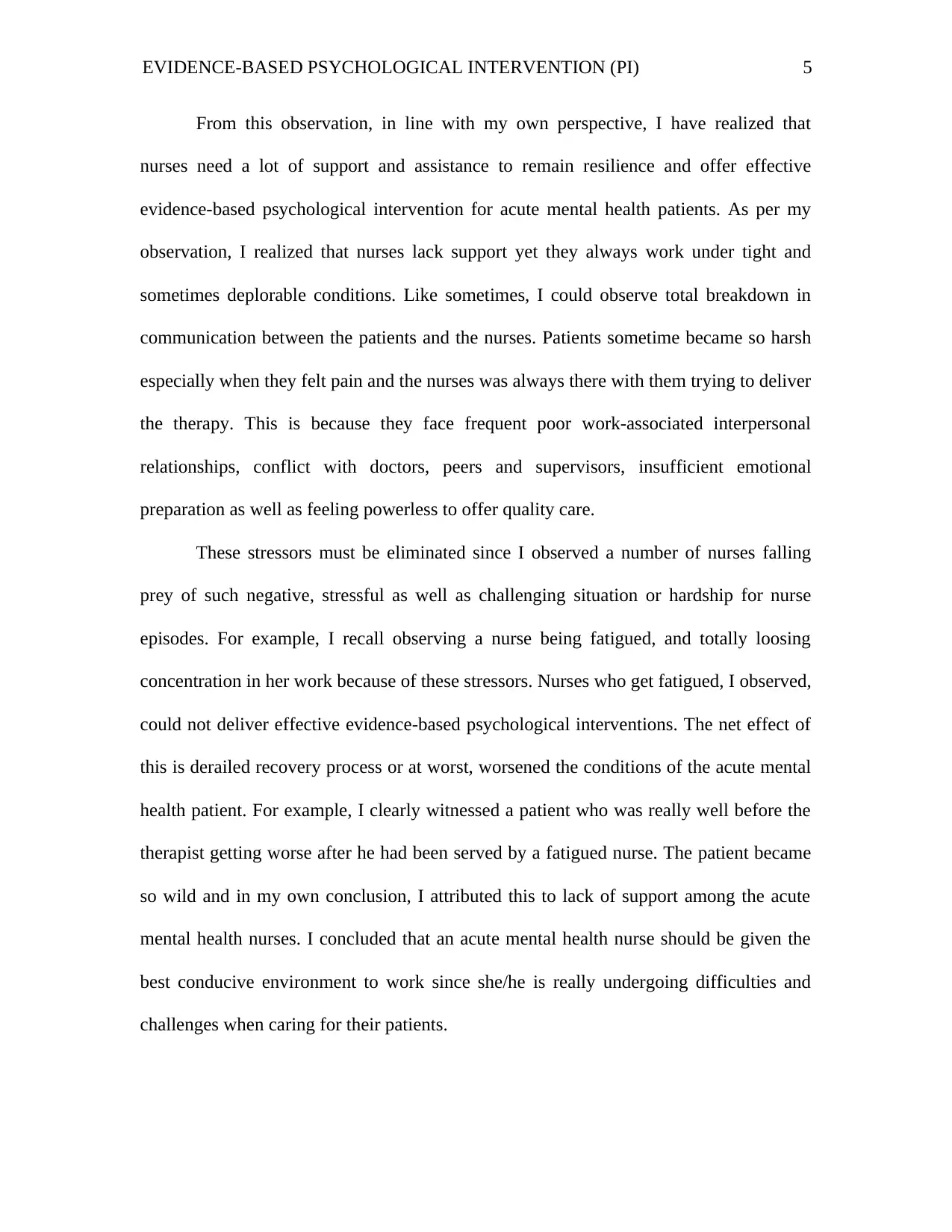
EVIDENCE-BASED PSYCHOLOGICAL INTERVENTION (PI) 5
From this observation, in line with my own perspective, I have realized that
nurses need a lot of support and assistance to remain resilience and offer effective
evidence-based psychological intervention for acute mental health patients. As per my
observation, I realized that nurses lack support yet they always work under tight and
sometimes deplorable conditions. Like sometimes, I could observe total breakdown in
communication between the patients and the nurses. Patients sometime became so harsh
especially when they felt pain and the nurses was always there with them trying to deliver
the therapy. This is because they face frequent poor work-associated interpersonal
relationships, conflict with doctors, peers and supervisors, insufficient emotional
preparation as well as feeling powerless to offer quality care.
These stressors must be eliminated since I observed a number of nurses falling
prey of such negative, stressful as well as challenging situation or hardship for nurse
episodes. For example, I recall observing a nurse being fatigued, and totally loosing
concentration in her work because of these stressors. Nurses who get fatigued, I observed,
could not deliver effective evidence-based psychological interventions. The net effect of
this is derailed recovery process or at worst, worsened the conditions of the acute mental
health patient. For example, I clearly witnessed a patient who was really well before the
therapist getting worse after he had been served by a fatigued nurse. The patient became
so wild and in my own conclusion, I attributed this to lack of support among the acute
mental health nurses. I concluded that an acute mental health nurse should be given the
best conducive environment to work since she/he is really undergoing difficulties and
challenges when caring for their patients.
From this observation, in line with my own perspective, I have realized that
nurses need a lot of support and assistance to remain resilience and offer effective
evidence-based psychological intervention for acute mental health patients. As per my
observation, I realized that nurses lack support yet they always work under tight and
sometimes deplorable conditions. Like sometimes, I could observe total breakdown in
communication between the patients and the nurses. Patients sometime became so harsh
especially when they felt pain and the nurses was always there with them trying to deliver
the therapy. This is because they face frequent poor work-associated interpersonal
relationships, conflict with doctors, peers and supervisors, insufficient emotional
preparation as well as feeling powerless to offer quality care.
These stressors must be eliminated since I observed a number of nurses falling
prey of such negative, stressful as well as challenging situation or hardship for nurse
episodes. For example, I recall observing a nurse being fatigued, and totally loosing
concentration in her work because of these stressors. Nurses who get fatigued, I observed,
could not deliver effective evidence-based psychological interventions. The net effect of
this is derailed recovery process or at worst, worsened the conditions of the acute mental
health patient. For example, I clearly witnessed a patient who was really well before the
therapist getting worse after he had been served by a fatigued nurse. The patient became
so wild and in my own conclusion, I attributed this to lack of support among the acute
mental health nurses. I concluded that an acute mental health nurse should be given the
best conducive environment to work since she/he is really undergoing difficulties and
challenges when caring for their patients.
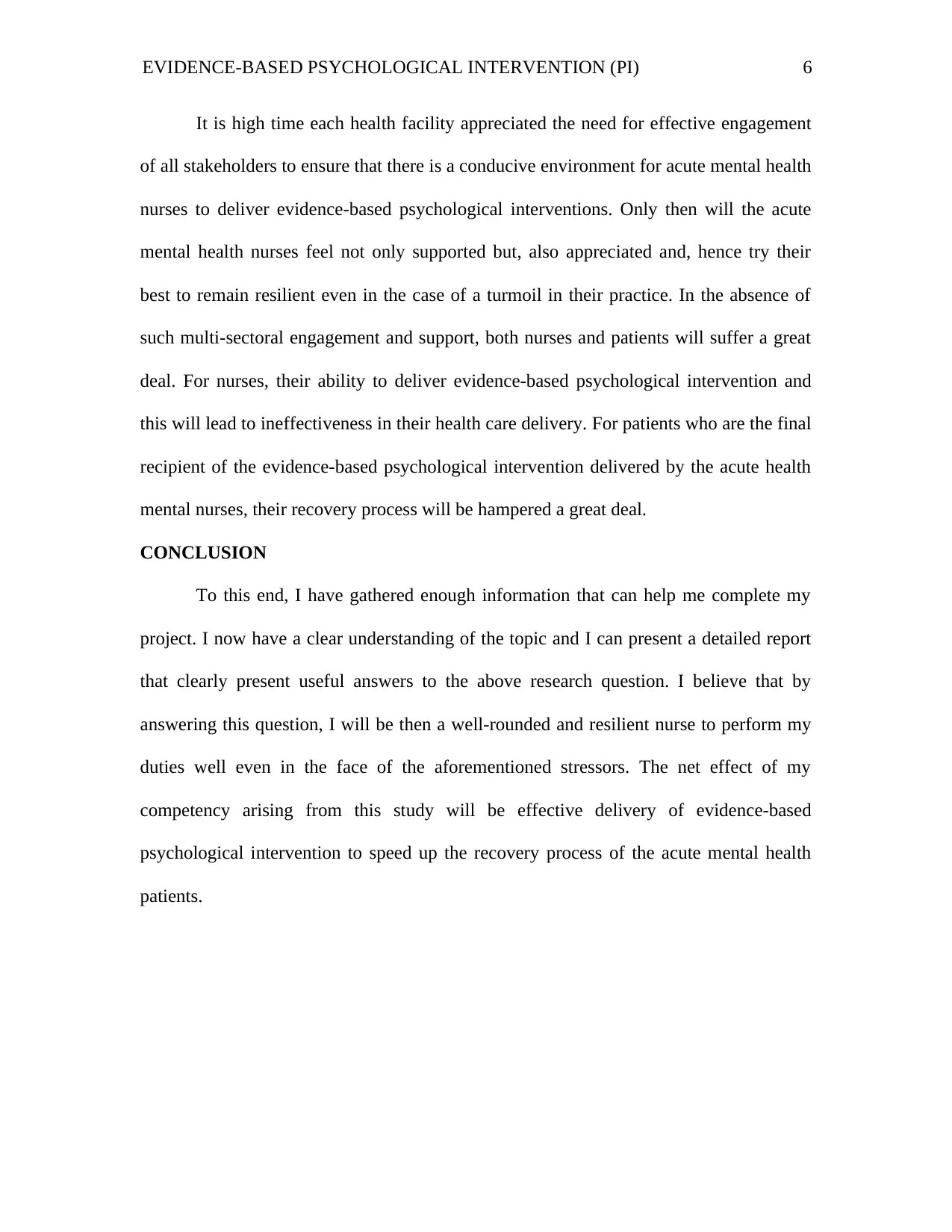
EVIDENCE-BASED PSYCHOLOGICAL INTERVENTION (PI) 6
It is high time each health facility appreciated the need for effective engagement
of all stakeholders to ensure that there is a conducive environment for acute mental health
nurses to deliver evidence-based psychological interventions. Only then will the acute
mental health nurses feel not only supported but, also appreciated and, hence try their
best to remain resilient even in the case of a turmoil in their practice. In the absence of
such multi-sectoral engagement and support, both nurses and patients will suffer a great
deal. For nurses, their ability to deliver evidence-based psychological intervention and
this will lead to ineffectiveness in their health care delivery. For patients who are the final
recipient of the evidence-based psychological intervention delivered by the acute health
mental nurses, their recovery process will be hampered a great deal.
CONCLUSION
To this end, I have gathered enough information that can help me complete my
project. I now have a clear understanding of the topic and I can present a detailed report
that clearly present useful answers to the above research question. I believe that by
answering this question, I will be then a well-rounded and resilient nurse to perform my
duties well even in the face of the aforementioned stressors. The net effect of my
competency arising from this study will be effective delivery of evidence-based
psychological intervention to speed up the recovery process of the acute mental health
patients.
It is high time each health facility appreciated the need for effective engagement
of all stakeholders to ensure that there is a conducive environment for acute mental health
nurses to deliver evidence-based psychological interventions. Only then will the acute
mental health nurses feel not only supported but, also appreciated and, hence try their
best to remain resilient even in the case of a turmoil in their practice. In the absence of
such multi-sectoral engagement and support, both nurses and patients will suffer a great
deal. For nurses, their ability to deliver evidence-based psychological intervention and
this will lead to ineffectiveness in their health care delivery. For patients who are the final
recipient of the evidence-based psychological intervention delivered by the acute health
mental nurses, their recovery process will be hampered a great deal.
CONCLUSION
To this end, I have gathered enough information that can help me complete my
project. I now have a clear understanding of the topic and I can present a detailed report
that clearly present useful answers to the above research question. I believe that by
answering this question, I will be then a well-rounded and resilient nurse to perform my
duties well even in the face of the aforementioned stressors. The net effect of my
competency arising from this study will be effective delivery of evidence-based
psychological intervention to speed up the recovery process of the acute mental health
patients.
⊘ This is a preview!⊘
Do you want full access?
Subscribe today to unlock all pages.

Trusted by 1+ million students worldwide
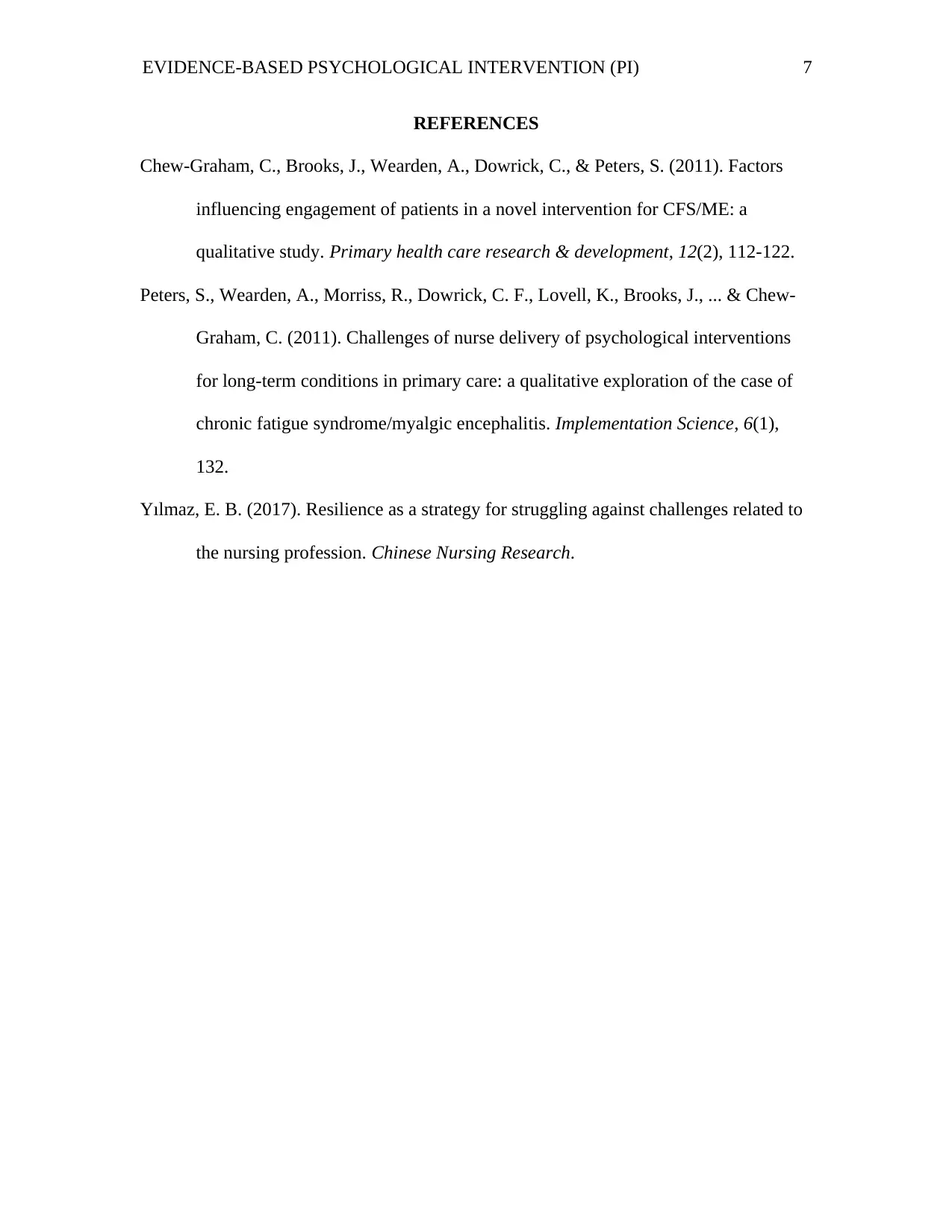
EVIDENCE-BASED PSYCHOLOGICAL INTERVENTION (PI) 7
REFERENCES
Chew-Graham, C., Brooks, J., Wearden, A., Dowrick, C., & Peters, S. (2011). Factors
influencing engagement of patients in a novel intervention for CFS/ME: a
qualitative study. Primary health care research & development, 12(2), 112-122.
Peters, S., Wearden, A., Morriss, R., Dowrick, C. F., Lovell, K., Brooks, J., ... & Chew-
Graham, C. (2011). Challenges of nurse delivery of psychological interventions
for long-term conditions in primary care: a qualitative exploration of the case of
chronic fatigue syndrome/myalgic encephalitis. Implementation Science, 6(1),
132.
Yılmaz, E. B. (2017). Resilience as a strategy for struggling against challenges related to
the nursing profession. Chinese Nursing Research.
REFERENCES
Chew-Graham, C., Brooks, J., Wearden, A., Dowrick, C., & Peters, S. (2011). Factors
influencing engagement of patients in a novel intervention for CFS/ME: a
qualitative study. Primary health care research & development, 12(2), 112-122.
Peters, S., Wearden, A., Morriss, R., Dowrick, C. F., Lovell, K., Brooks, J., ... & Chew-
Graham, C. (2011). Challenges of nurse delivery of psychological interventions
for long-term conditions in primary care: a qualitative exploration of the case of
chronic fatigue syndrome/myalgic encephalitis. Implementation Science, 6(1),
132.
Yılmaz, E. B. (2017). Resilience as a strategy for struggling against challenges related to
the nursing profession. Chinese Nursing Research.
1 out of 7
Related Documents
Your All-in-One AI-Powered Toolkit for Academic Success.
+13062052269
info@desklib.com
Available 24*7 on WhatsApp / Email
![[object Object]](/_next/static/media/star-bottom.7253800d.svg)
Unlock your academic potential
Copyright © 2020–2026 A2Z Services. All Rights Reserved. Developed and managed by ZUCOL.





